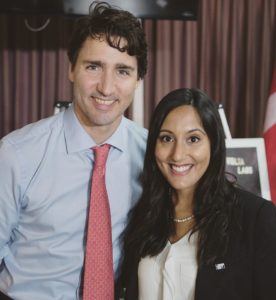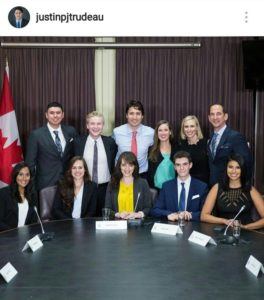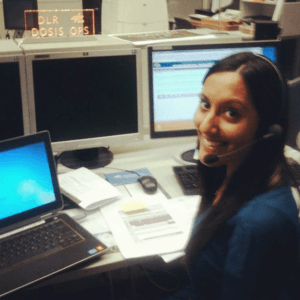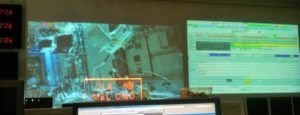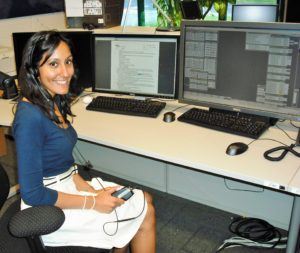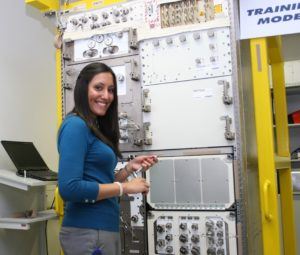Profile
Vinita Marwaha
Curriculum Vitae
-
Education:
Buckland Primary School, Surrey (1990), Our Lady Immaculate RC Primary School (1990-1998), Tolworth Girls’ School (1998-2005), King’s College London (2005-2008), International Space University (ISU) (2008 & 2009-2010), Cranfield University (2008-2009).
-
Qualifications:
BSc Mathematics and Physics with Astrophysics at King’s College London, Space Studies Programme (SSP) at International Space University (ISU-2008), MSc Astronautics and Space Engineering at Cranfield University, MSc Space Management at International Space University (ISU)
-
Work History:
Consultant, Founder – Rocket Women, PR & Communications Team Co-Lead at Space Generation Advisory Council (SGAC) in Support of the UN Programme on Space Applications, Engineering Manager-Intelligent Transportation Systems at Miovision Technologies (Canada), ISS Payload Operations Engineer at DLR (German Aerospace Centre), Trainee at European Space Agency (ESA), Research Assistant at King’s College London.
-
Current Job:
Consultant – Space Engineering & STEM Outreach
-
Employer:
Independent
-
My work
I’m a Space Operations Engineer at the European Space Agency (ESA), working on operations preparation for the European Robotic Arm to be launched to the ISS.. I’m also the founder of a website called Rocket Women, which inspires young women to consider a career in STEM. Prior to becoming a consultant, I worked as an ISS Operations Engineer at the German Aerospace Centre (DLR) and at the European Space Agency (ESA) focusing on spacesuit design & EVA (spacewalk) training.
-
Read more
Only 6% of UK engineering workforce are female, meaning that UK companies are missing out on almost 50% of their engineering talent. This is coupled with the fact that girls make up under 20% of students taking Physics A-level. The goal of Rocket Women, is to try and reverse this trend by inspiring girls globally to consider a career in STEM (Science, Technology, Engineering, Maths) and also provide advice to women currently working in the industry.
To encourage more girls to consider STEM you also need to inspire them when they’re young and provide them with tangible, visible role models. I remember being an enthralled six-year-old when I learned that the first British astronaut, chemist Helen Sharman flew to the Mir space station. She was, although I didn’t know it yet, a role model to me. She showed me at a young age that my dreams were possible and I went on to work in human spaceflight. I started Rocket Women to give these role models a voice and a platform to spread their advice. I’m interviewing women around the world in STEM, particularly in space, and posting the interviews on Rocket Women, along with advice to encourage girls to be involved in STEM.
-
My Typical Day
As a consultant, from developing a space engineering curriculum, to writing a parabolic grant proposal. representing Rocket Women at a school to discussing the importance on inspiring the next generation with leadership (including the Canadian Prime Minister Justin Trudeau)!
-
Read more
As a consultant my typical day varies depending on the projects I’m working on. From writing a parabolic (microgravity) flight grant proposal, to explaining the nuances of Apollo era spacesuit design and even discussing the importance of inspiring the next generation with politicians. Whilst I’m consulting I’ve also decided to fulfill another dream, to travel around the world. I’ve been fortunate to have travelled in Europe and Southeast Asia for the last 10 months. Prior to this I’ve usually worked in a traditional engineering environment. Being based at the German Aerospace Centre (DLR) in Cologne, Germany I worked on console, in an environment similar to a smaller version of NASA’s Mission Control. My typical day involved supporting astronauts onboard the International Space Station to carry out experiments successfully, developing new experiment payloads with scientists, helping to train astronauts on payload experiments and equipment they might use on the ISS, communicating with NASA & ESA colleagues on a regular basis regarding experiments and writing crew (astronaut) procedures. The most important skills for an ISS Operations Engineer are communication, both on console and with your international colleagues based around the world, and more specifically, the ability to think quickly to provide an accurate response in case of an anomaly on the ISS.
-
What I'd do with the prize money
Inspire students at schools throughout the UK by travelling to schools to carry out talks about the impact you can have through a career in science and space
-
Read more
Portraying successful female role models in the space industry, particularly those involved in the Principia mission, along with informing schools of the progress and science carried out during Tim Peake’s mission. I have founded a platform called Rocket Women (www.rocket-women.com), to inspire women to study STEM and consider a career in the space industry. Through this I’ve completed interviews with women in the space industry, providing them with a voice to inspire others. A series of interviews with women working in the UK space industry could be carried out, recorded on video or audio, along with a series of publications and leaflets to be distributed to schools. These female role models and I would visit the schools to provide talks regarding their career and the Principia mission, providing tangible examples to young girls alongside necessary interaction with women in the space industry. This campaign would bring awareness of Tim Peake’s mission and the related work carried out by UK scientists, engineers and others in STEM to young girls. The leaflets can be published through digital media channels and made available as educational resources for both teachers and students.
Interactions with these role models and learning about the Principia mission will provide girls with examples to look up to when they’re making the most critical decisions in their education. Improving gender diversity in the UK space industry will not only mitigate the UK talent shortage of women in technical roles, but ensure that there will be role models for future generations to look up to and aim towards.
-
My Interview
-
How would you describe yourself in 3 words?
Space-Geek, Inquisitive, Wanderlust
What was your favourite subject at school?
Biology and Physics
What did you want to be after you left school?
An ISS Operations Engineer. I told my Physics teacher in Year 7 that I wanted to work in NASA’s Mission Control. He and my science teachers supported my dream throughout my education and I was lucky enough to work on ISS operations 12 years later!
Were you ever in trouble at school?
Not really. I’ve always been passionate about space and was lucky that was goal was supported throughout school.
What is the most fun thing you've done?
I’ve been fortunate to have spent the last 10 months travelling in Eastern Europe and Southeast Asia. Whilst visiting countries including Indonesia, Myanmar and Cambodia, I became acutely aware of the differences associated with the role of girls in society compared with their male counterparts, in particular places that I visited. Mainly related to the limited jobs available to girls and the lack of access to education. In fact 62 million girls around the world don’t have access to education, education that they need and truly deserve. Michelle Obama and her Let Girls Learn campaign, a US government initiative, are focused on changing that. Having talked to girls in Asia and heard stories of their dedication to gain an education, this campaign means a lot to me.I care because even though I’m from the UK, my Mum was born and raised in India and my Father in Kenya. Having visited both these countries and talked to family, I know how lucky I am to be barely one generation away from having a choice regarding my education and career path. In India, my great-grandmother was married at 13 and similarly with her children, my grandmother. In countries around the world, the belief of treating girls as second-class citizens whilst prioritising the education of male family members still stands. We need 100% of the talent available on this planet to reach for the stars and make the next crucial scientific breakthroughs. It’s 2016 not 1916, so together let’s make sure every girl, no matter where she may be born, is both allowed to dream and has the support to reach her dreams, through access to consistent education. Together let’s give girls back their future.
-
-
Work photos:
I was truly honoured to meet the Canadian Prime Minister Justin Trudeau in June 2016 to represent Rocket Women (www.rocket-women.com) and take part in an intimate round table discussion regarding the importance of inspiring the next generation, women in STEM and education!
Carrying out International Space Station (ISS) payload operations at the German Aerospace Centre (DLR) in Cologne, Germany. Operating payloads on the ISS and guiding astronauts through experiments on the ISS.
Working on the training model of an ISS ESA payload (Electromagnetic Levitator-EML) to train astronauts and develop astronaut procedures.

